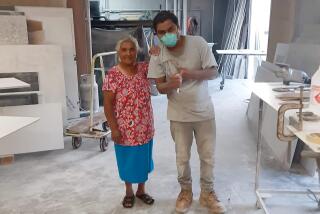Breast Implant Surgeons Wrestle With Doubts, Fears
- Share via
WASHINGTON — These days, when Dr. Harry A. Glassman gets home from work, he begins returning telephone calls from frightened patients. Sometimes he talks to as many as two dozen women an evening, conversations that often last until late into the night.
“I have made an effort to answer all of their questions, but what it gets down to is this: I don’t have an answer,” he said.
Glassman, a Beverly Hills, Calif., plastic surgeon, is worried. During 17 years of practice, he has placed silicone gel breast implants into an estimated 1,500 women, confident that they were safe, he says. Now he is not so sure.
Although he has never seen a single instance of autoimmune disease in any of his patients with the implants, he nevertheless is disturbed by reports of such cases from rheumatologists whose work he respects. Months before the Food and Drug Administration’s Jan. 6 call for a moratorium on the silicone gel implants, Glassman decided on his own to err on the side of caution until the questions were resolved. He stopped using silicone gel.
“I believed that the manufacturers had done their homework,” he said. “Today, I don’t know whether they have or they haven’t.”
The community of plastic surgeons has found itself in a troubling state of limbo because of the controversy over the implants. Questions and doubts escalate almost daily over whether they are safe. And the debate has been fueled by the call for the moratorium, by publicity about growing litigation against Dow Corning Corp.--the leading manufacturer of the implants--and by numerous reports about Dow Corning’s role in the research process as depicted in internal company memorandums.
The public position of the American Society of Plastic and Reconstructive Surgeons has been to reassure patients--particularly those who are not experiencing problems--and call for the public release of all the studies, memos and other information that prompted the moratorium request.
At the same time, many surgeons say that they have begun to wonder where the truth lies. They say that they are not sure what to tell their nervous patients--because they are unsure of what to tell themselves.
“The mood among plastic surgeons is one of frustration and a little bit of panic, wondering what is going on and what will happen next,” said Dr. William Shaw, chief of plastic surgery at UCLA Medical Center.
“The whole thing has gotten out of hand,” Shaw said. “The bottom line is: The FDA does not operate on patients. The trial lawyers do not operate on patients. Their judgment is fine--but they don’t have the expertise that we have had. And they aren’t getting the phone calls we are.”
There are known risks associated with the implants, including hardening caused by the scar tissue that develops around the implant after surgery, leakage of silicone gel from the implant, rupture of the implant and interference with mammography. Plastic surgeons have long been aware of these problems. They say that they have always discussed them with prospective patients.
But the most compelling question is whether silicone in the estimated 2 million implants that have been placed in women causes cancer or autoimmune disease, ailments that occur when something triggers an attack by the immune system on some part of the body. Numerous women have developed connective tissue disorders, such as arthritis and lupus, that they attribute to the implants, and they have been backed by several leading rheumatologists. But research is inconclusive.
‘I think we were collectively naive 10 or 15 years ago about these devices, and the companies were not overly enthusiastic about correcting that,” said Dr. Scott Spear, a plastic surgeon at Georgetown University Hospital here.
Shaw agrees. “Everybody, really, shares in the responsibility. Everybody wanted to believe in a wonderful thing. Everybody was looking at the positive side for years, much more so than the negative side.”
Dr. Paul Striker, a New York plastic surgeon for 21 years, has never offered silicone gel implants to his patients. That puts him in the minority among plastic surgeons. He has opted instead for saline-filled implants, which are considered less aesthetically pleasing than silicone gel--but are believed to be safer.
When Striker began practicing, “I had no idea that silicone bled through the implant. If Dow Corning knew, they hadn’t told us. I just didn’t like the idea of all that silicone getting out loose in the body if something happened to the envelope.
“None of us knew it bled. When we found out, I was even more sure I was using the right implant. I’m sleeping well at night and so are my patients, knowing that they have salt water in their breast implants and not silicone.”
Nevertheless, he is not convinced that silicone gel is responsible for autoimmune disease. And he is angry that the process--the FDA’s behavior and that of the courts and lawyers--is “scaring thousands of women to death.”
But he acknowledges that the events of recent weeks have sprouted “little seeds of doubt” in his mind. “I don’t want to admit to myself that the company may have duped us,” he said.
Dr. Joel Rein, chief of plastic surgery at Greenwich Hospital in Greenwich, Conn., has used silicone gel exclusively for 21 years. He is also annoyed at the process, which he describes as “mass hysteria fueled by the lawyers.” And he says he is upset that he must try to calm worried patients.
“We’ve had 30 to 40 calls within the last two weeks, and I’ve personally seen over 18 patients,” he said.
Many of the surgeons say that the FDA should have publicly released the information when it called for the moratorium. That way, they say, the medical community would have been better equipped to evaluate it--and to answer patients’ questions. The agency, however, was bound by law from doing so. Dow Corning has announced that it will soon release the documents.
“If we all could have gone back 18 months, this could have been settled around a coffee table with people saying: ‘Let’s find out the truth about this,’ ” Glassman said. “But instead of becoming scientific, it became politicized.”
Until a few weeks ago, Spear did not consider autoimmune disease to be a significant risk. Now he believes that “we need to look at it in a more aggressive way than I might have thought before.”
Spear says that he also is troubled by reports he has been reading about studies and company memos.
“They represent a picture that is undesirable,” he said. “The memos by themselves create the impression that things were not done as they should have been, and studies raise questions about the validity of the research.
“For people who believe in this product, it must be unsettling,” he said. “For those who oppose these devices, it’s the final proof.”
He said that he fears the current battle may end with no implants of any kind. “I feel that some form of breast implant is a wonderful tool for women, and I’d hate to be at the point where we will have nothing to offer them,” he said. “That would be a public health tragedy.”
And Glassman, in Beverly Hills, remains torn.
“Our job is to inform people of the possible risks, and I think we’ve done a very good job of that all along,” he said. “But what would happen if I found out there was a risk that the company knew about--that I didn’t know about? I’d be furious.
“What I want more than anything else is the truth to be known,” he added. “We’re not just entrepreneurs or businessmen--we’re doctors, we’re human beings, and we don’t want to hurt people.”






